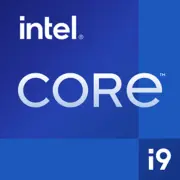Intel Core i9-9920X X-series

Intel Core i9-9920X X-Series: Comprehensive Review of the 2025 Processor
Current as of April 2025
1. Key Specifications: Architecture, Process Technology, and Key Features
The Intel Core i9-9920X processor, released in late 2018, remains in demand in 2025 due to its multi-threaded performance. Despite its age, it continues to hold a position in the workstation niche.
Architecture and Process Technology
- Code Name: SkyLake-X (modification of the SkyLake architecture for HEDT platforms).
- Process Technology: 14 nm (obsolete by 2025 but optimized for high workloads).
- Cores/Threads: 12 cores, 24 threads.
- Base/Boost Frequency: 3.5 GHz / 4.5 GHz (Turbo Boost Max 3.0).
- TDP: 165 W — high power consumption requiring effective cooling.
Key Features
- Support for Intel Hyper-Threading and AVX-512 for professional tasks.
- 16 PCIe 3.0 lanes (expandable to 44 via X299 chipset).
- L3 Cache: 19.25 MB.
Performance
- Geekbench 6: Single-Core — 1368, Multi-Core — 9627.
- For comparison: Ryzen 9 5900X (12 cores) scores ~1500/10500, but is more expensive in 2025.
2. Compatible Motherboards: Sockets and Chipsets
The processor uses the LGA 2066 socket, which limits motherboard choices to outdated but available models.
Recommended Chipsets:
- Intel X299: The only option for SkyLake-X.
- Examples of motherboards: ASUS ROG Rampage VI Extreme, Gigabyte X299 AORUS Gaming 9.
- Features: support for quad-channel memory, overclocking, numerous PCIe slots.
What to Look For:
- VRM Module: Due to the 165 W TDP, a motherboard with a robust power phase (at least 8+ phases) is required.
- VRM Cooling: Boards with heatsinks on MOSFETs — for example, MSI X299 PRO.
- Prices: New X299 motherboards in 2025 are rare, but leftovers are sold for $250–400.
3. Supported Memory
- Type: DDR4 (DDR5 not supported).
- Modes: Quad-channel (optimal configuration for maximum bandwidth).
- Frequencies: Up to 2666 MHz (officially), but overclocking to 3200–3600 MHz is possible on compatible motherboards.
- Maximum Capacity: Depends on the board — usually up to 256 GB (8 slots × 32 GB).
Tip: Use DDR4-3200 CL16 kits (e.g., Corsair Vengeance LPX) for optimal balance of price and performance.
4. Power Supply Recommendations
Considering the 165 W TDP and system requirements:
- Minimum PSU Power: 750 W (for PCs with a GPU at the level of RTX 4070 Ti).
- Recommended: 850 W with 80+ Gold certification or higher (Corsair RM850x, Seasonic PRIME GX-850).
- Features:
- Quality cables and voltage stability are critical for overclocking.
- Avoid cheap PSUs — voltage spikes can damage the CPU.
5. Pros and Cons of Intel Core i9-9920X
Pros:
- High multi-threaded performance for rendering, encoding.
- Affordable price in 2025: $400–500 (new, leftovers in stock).
- Support for quad-channel memory and a large number of PCIe devices.
Cons:
- Outdated 14 nm process: high heat and power consumption.
- No support for PCIe 4.0/5.0 and DDR5.
- Underperforms against Ryzen 9 7900X in single-threaded tasks (~15–20%).
6. Usage Scenarios
Work Tasks:
- 3D Rendering (Blender, V-Ray): 12 cores perform faster than 8-core CPUs.
- Video Editing (Premiere Pro): Rendering acceleration when working with 4K/8K.
- Simulations (ANSYS): AVX-512 enhances performance in scientific calculations.
Gaming:
- Streaming (OBS + gaming): 24 threads allow for video encoding without lag.
- 4K Gaming: The processor will not be a bottleneck with a GPU at the level of RTX 4080.
- Downside: In older games (e.g., CS2), the Ryzen 5 7600X will show higher FPS.
Multimedia:
- Photo processing in Lightroom + parallel browsing and background work — ideal.
7. Comparison with Competitors
- AMD Ryzen 9 5900X (12 cores):
- Pros: 7 nm, PCIe 4.0, lower TDP (105 W).
- Cons: More expensive ($550 in 2025), weaker in AVX workloads.
- Intel Core i7-14700K (20 cores):
- Pros: New 10 nm process, DDR5.
- Cons: Higher price ($600), limited PCIe controller.
- Conclusion: The i9-9920X is a good budget workhorse, but not a future-proof upgrade.
8. Assembly Tips
1. Cooling:
- Minimum — Noctua NH-D15 ($90).
- Optimum — AIO Arctic Liquid Freezer II 360 ($120).
2. Case: Choose models with ventilation (Lian Li Lancool III, be quiet! Silent Base 802).
3. Overclocking: VCore voltage should not exceed 1.35 V — otherwise, overheating is inevitable.
4. BIOS: Update to the latest version for improved stability.
9. Final Verdict: Who is the i9-9920X Suitable for in 2025?
This processor is relevant for:
- Budget Workstations: Video editors, engineers who need many cores for $400.
- Upgrade Enthusiasts: If there is an existing X299 board and DDR4.
- Streamers: Streams + discrete GPU — the ideal balance.
Not Recommended:
- Gamers focused on maximizing FPS.
- Users planning to transition to DDR5 and PCIe 5.0.
Conclusion: The Intel Core i9-9920X is a proven option for professionals, but only if compatible components are available. In 2025, it’s a choice for those who value price-performance ratio and multi-threaded power rather than the latest technologies.
Basic
CPU Specifications
Memory Specifications
Miscellaneous
Benchmarks
Compared to Other CPU
Share in social media
Or Link To Us
<a href="https://cputronic.com/en/cpu/intel-core-i9-9920x-x-series" target="_blank">Intel Core i9-9920X X-series</a>